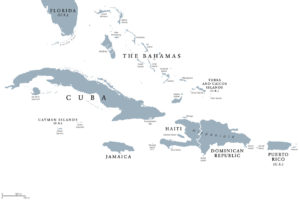Law Affecting Cuban Property May Result in the Return of Hundreds of Thousands of Stolen Property

Greater Antilles political map with English labeling. Grouping of the larger islands in the Caribbean Sea with Cuba, Hispaniola, Puerto Rico, Jamaica and the Cayman Islands. Gray illustration. Vector.
All eyes should be on a recently enacted provision of an old law that could result in cases filed by flocks of Cuban nationals trying to reclaim property seized during Fidel Castro’s takeover of the island.
U.S. Secretary of State Mike Pompeo’s announcement that Title III of the Cuban Liberty and Democratic Solidarity Act, also known as the Helms-Burton Act, was ordered into effect by President Donald Trump made huge headline because of its implications to corporations and courtrooms. Title III allows exiles who believe their homes and land were confiscated when the 1959 revolution took place to sue anyone on a long list of companies embargoed by the United States.
“The Cuba Restricted List identifies entities and sub-entities under the control of Cuban military, intelligence, or security services,” the U.S. Department of State said in a media note. “These security services are directly responsible for the repression of the Cuban people. We encourage any person doing business in Cuba to reconsider whether they are trafficking in confiscated property and abetting the Cuban dictatorship.”
Every president since the act was signed by Bill Clinton in 1996 has suspended the controversial provision, enabling corporations in cahoots with the Cuban government to profit off property potentially owned by someone else.
“We’re trying to seek justice for all of these families that have had their property taken and could only sit by while foreign investors do business with companies who seized their property,” Nick Gutierrez, a Cuban-American who has helped line up litigation documents for hundreds of those who fled the country six decades ago, told the Daily Business Review in an article titled “Attorneys Prepare to File Lawsuits on Behalf of Cuban-Americans Whose Property Was Confiscated by Castro.”
The claims could number into the hundreds of thousands because of language in the provision that enables newly naturalized Cubans to take action to recover what once was theirs.
“The properties range from vacation beach houses to some of Cuba’s largest state-owned and joint-venture companies,” according to an article in The Washington Post titled “U.S. tightens Cuban embargo, allowing legal claims for confiscated property.”
The U.S. Foreign Claims Settlement Commission already has certified 6,000 cases – the tip of the iceberg.
“Cuba’s intelligence and military services are involved in many of the businesses, particularly in the tourism sector,” The Washington Post article states. “But the law’s Title III provision, allowing U.S. citizens to sue for three times the current value of confiscated property worth more than $50,000, has been suspended every six months since it was enacted, as successive administrations determined it would be harmful to U.S. trade and relationships with allies that have investments in Cuba.”
That changed overnight and opened up an unprecedented area of practice for firms far and wide.
“Today expect the United States to take the first in a series of steps to hold the regime in #Cuba accountable for its 60 years of crimes & illegality which includes its support for the murderous #MaduroCrimeFamily,” Republican Florida Sen. Marco Rubio said on Twitter. “Justice is coming. And more to come.”
Billions of dollars are at stake, as the embargoed entities include holding companies, hotels such as the five-star Gran Hotel Manzana Kempinski and Iberostar Grand Packard Hotel in Havana, marinas and stores. A pair of rum companies are on the list, too: Ron Caney and Ron Varadero.
“A complete lifting of the ban could let potentially billions of dollars in legal claims move forward in U.S. courts and likely antagonize Canada and U.S. European partners, whose companies have significant business holdings in Cuba,” states a Reuters article titled “U.S. allows lawsuits against Cuban entities but shields foreign firms for now.” “It could also affect some U.S. companies that have begun investing in the island since former President Barack Obama’s opening to the old Cold War foe. Allowing the provision to go into effect even on a limited basis could undermine efforts by Cuban President Miguel Diaz-Canel to foster foreign investment and promote tourism to bolster the Caribbean island’s fragile economy.”
Even Cigar Aficionado weighed in.
“The spate of litigation likely to ensue – the State Department predicted between 75,000 and 200,000 potential lawsuits in one report to Congress – would stifle much-needed foreign investment in Cuba and antagonize U.S. allies whose companies have been investing in Cuba for decades,” states an article titled “U.S. Opens Door To Lawsuits Against Cuba.”
The story led a reader to quip, “Not sure this will help us get any closer to normalizing relations, let alone better access to cigars.”
Share This


